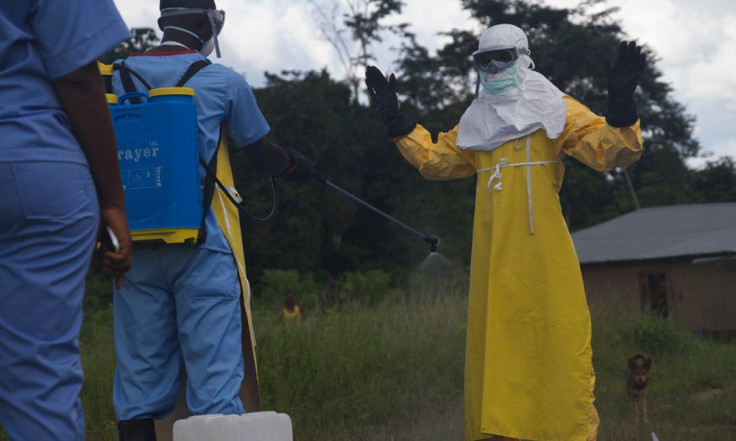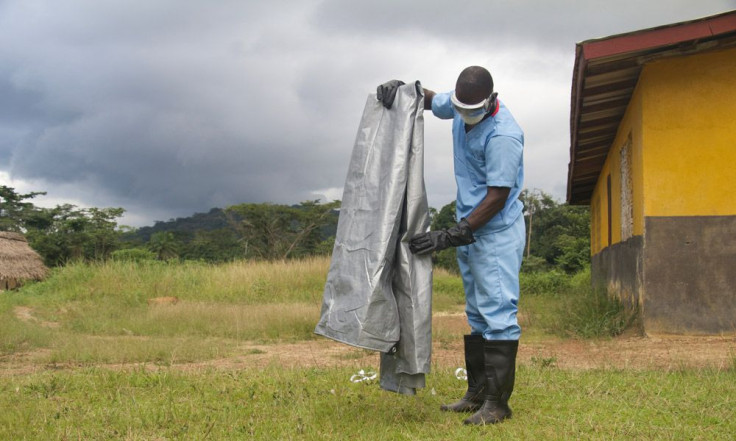Ebola Outbreak: Health Care Workers Needed, But Quarantines, Travel Bans Pose Obstacles

International aid organizations said Wednesday that health workers from countries around the world need to continue to volunteer their time and energy to the fight against Ebola on the ground in West Africa for the foreseeable future. The need for qualified, trained aid workers in Liberia, Sierra Leone and Guinea will only continue to grow as more treatment centers and hospitals are built. But aid group officials worry that they might not be able to fill the demand amid growing concerns about travel restrictions and contracting the disease.
The new Ebola treatment unit opened last month by the International Medical Corps in a jungle clearing in rural Suakoko, Liberia, is currently fully staffed with about 180 workers, according to Dr. Pranav Shetty, the aid group’s emergency health coordinator. But Shetty -- who spoke to International Business Times via cellphone Wednesday afternoon from the grounds of the blue-roofed facility -- said that could change almost overnight if the influx of volunteers wanes.
“Even if I said we have the number of volunteers we need here at this Ebola treatment center right now, that’s going to change because at the end of the month we need to rotate new people in. It’s hard right now to say what we need in the future,” Shetty said over the sounds of Liberian health professionals’ prayers and songs as they prepared to head into the infection area. “More national and international staff are going to be needed and more staff need to be trained in order to work effectively … For international staff we’re always in a rolling ongoing recruitment process, because if a staff member leaves they need to be replaced.”
World Bank President Jim Yong Kim said Tuesday that more than 5,000 additional international doctors, nurses and other health professionals will be needed to effectively fight the outbreak, the Associated Press reported. Reliable data about the number of visiting volunteers currently fighting Ebola in West Africa was not readily available Wednesday. But officials with aid organizations with boots on the ground there, such as Boone, North Carolina’s Samaritan’s Purse and the Los Angeles-based International Medical Corps, said that they will need a steady flow of new volunteers until the epidemic comes to an end.

Attracting those workers has only grown more difficult in recent weeks, as a perfect storm of complications is coalescing to make both recruiting qualified volunteers and serving as an Ebola nurse or doctor a more difficult task than ever. The World Health Organization said Wednesday that the number of confirmed Ebola cases worldwide had reached 13,703. Nearly 5,000 people have died in the epidemic.
“There’s a combination of two things that prevent a lot of people in the international community from responding to the crisis. The first is just fear, the fact that it’s the unknown, it’s such a deadly disease, and even most international volunteers haven’t dealt with something like this,” Jim Walker, deputy director for international projects at Samaritan’s Purse, told IBTimes Wednesday. “Add to that the uncertainty, particularly in America with all these policy changes and adjustments, locking people in the hospital, things like that. That has all had an impact on volunteers.”
Travel bans and quarantine policies imposed by a smattering of countries and American states in recent days and weeks often require that people returning from Liberia, Sierra Leone and Guinea remain in isolation for 21 days, thereby adding another three weeks of time off work they would need to take to complete a trip.
“[B]urdensome and unnecessary quarantines for returning health care workers are likely to discourage workers from volunteering to serve,” Rebecca Dresser, a professor of law and medical ethics at Washington University in St Louis, said via email. “If quarantine or other restrictions of returning workers are necessary to protect others from infection, such as when a worker had a high-risk exposure to Ebola, that person should be provided with comfortable living conditions and compensation for lost wages and other economic losses.”
Plus, there are the overlapping issues of will and interest. Even though Ebola-related fear will likely remain high for some time, the amount of attention paid to the outbreak is bound to wane at some point as news fatigue and emerging reports of declining rates of infection relegate West Africa back to the back pages of newspapers and off the home pages of web outlets. That means fewer health care workers might be inspired to volunteer.
“There’s a fair analogy to terrorism,” Walker said. “You can choose to go abroad and fight terrorism at its source or you can wait until it comes to America and fight it here.”
© Copyright IBTimes 2024. All rights reserved.



















